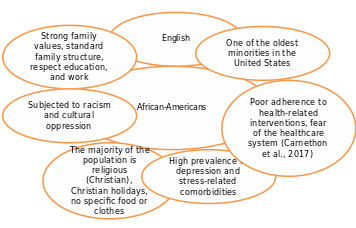The chosen population for this culture-centered healthcare intervention is the African Americans living in Jackson, Mississippi. The culture presented in Graph 1 provides an assessment of the main elements of beliefs and customs prevalent in this community that can affect the view of the health-related initiatives. African-Americans account for over 80% of the city’s population, with approximately 140,000 individuals of this ethnicity living there (“Race and ethnicity in Jackson, Mississippi,” n.d.). The issue of heart disease in the chosen population is affecting not only the community in Jackson but also across the county since over 170,000 people were diagnosed with a heart condition. On average, an individual from this community loses about ten years of life because of the complications as a result of cardiovascular disease, and this paper aims to develop a culturally appropriate intervention targeting this issue.
In order to design an effective intervention, one must consider the cultural specifics that affect the chosen and the factors that have the most significant impact on the heath of the African-Americans. According to Carnethon et al. (2017), in this population, the onset of cardiovascular conditions occurs at an early age, when compared to other populations. Another issue is the lack of adherence to disease management strategies, resulting in a high prevalence of disparities. Carnethon et al. (2017) argue that one of the issues that affect the health of African-Americans of the preference for soul food, which does not correspond with the dietary recommendations for reducing the heart disease risk provided by national healthcare organizations. It is because the majority of the food intake consists of sweetened or fried dishes, and the physical activity in this community is usually low. Additionally, the overall support of lifestyle changes in African-American families is low, which usually affects the interventions and efforts of various researchers to improve the health of this community (Carnethon et al., 2017). Based on this information and the factors assessed in the culturagram one can argue that heart disease prevention in this community should be led and supported by its leaders.
The main factors, such as food preference and physical activity levels, are difficult to change, especially considering the lack of trust towards healthcare institutions due to varied historical reasons that can be seen in this community. Considering other factors that contributed to the failure of many interventions designed for this population that Carnethon et al. (2017) outline and the need to “increase the engagement of all African Americans in the healthcare system”, one can argue that only engaging families or neighborhoods in the intervention programs can help reduce the risks of heart disease (p. e393). Hence, the main idea of the proposed approach is to improve the knowledge of the problem, its effects, and strategies for mitigating the adverse consequences by working with an entire community, instead of trying to affect one individual at high risk of developing heart disease.
The intervention targeting the reduction of heart disease within the chosen population at Jacksonville is compliant with the CLAS standards, since it considers the cultural specifics of the chosen population, promotes leadership and workforce engagement of the African-Americans, and established goals, such as promoting adequate health practices in this community, compliant with the cultural and linguistic specifics. Overall, the proposed scenario uses evidence-based practices to target heart disease in the chosen community.

References
Carnethon, M. R., Pu, J., Howard, G., Albert, M. A., Anderson, C. A. M., Bertoni, A. G., Mahasin S. M.,… Yancy, C. W. (2017). Cardiovascular health in African Americans: A scientific statement from the American Heart Association. Circulation, 136(21), e393–e423.
Race and ethnicity in Jackson, Mississippi. (n.d.). Web.